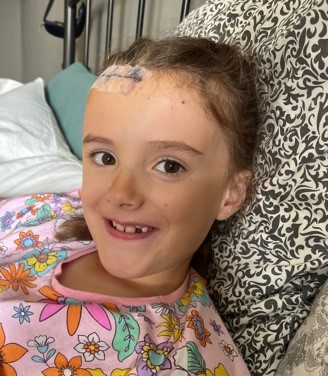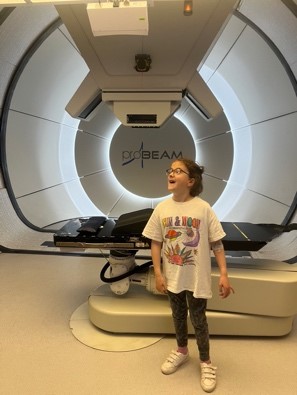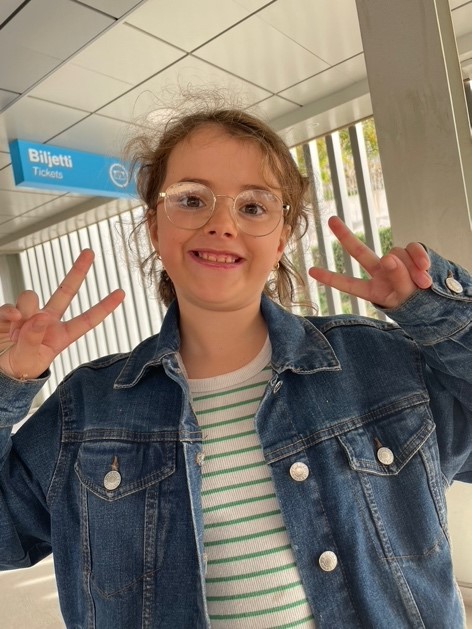An opportunity is available to be involved the OxyMOTION Study, taking place at the University Hospital Basel.
What is the OxyMOTION Study?
For the first time, research has shown that people with AVP deficiency can experience a 'clinically relevant' deficiency in oxytocin. In this context, 'clinically relevant' means significant enough to cause symptoms that warrant treatment.
This study aims to look at whether oxytocin treatment can improve emotional recognition and stress response for these people. It will look at the effects of oxytocin on someone's ability to recognise emotions and response to stressful situations.
What is oxytocin?
Oxytocin is a hormone produced in the brain that has positive impacts on social bonding and feelings of love, trust and relaxation. It is made in the brain in response to vasopressin. Therefore, people with AVP deficiency (who do not produce vasopressin) may experience deficiencies in oxytocin, even if they are treated with desmopressin.
Many people with AVP deficiency report symptoms of anxiety, low mood, social withdrawal and reduced quality of life, which may result from oxytocin deficiency.
What does this study involve?
This study will last around 9 weeks. If you choose to take part in this study, it will involve:
- 1 x initial screening visit to see if you are suitable to take part (lasting 2-3 hours)
- 4 x study visits (each lasting 2-3 hours)
- Undergo treatment with either an oxytocin nasal spray or a placebo nasal spray
The study visits will be split into two parts - part A and part B
Part A - On the 2nd and 3rd study visits, you will be tested on your emotion recognition, using computer tests
Part B - On the 1st and 4th study visits, you will be tested on your reaction to a stressful situation using questionnaires and blood samples*
*Participation in part B is only possible if your cortisol axis is intact. The study organisers will be happy to check if this applies to you.
You will also need to travel to Switzerland twice, with all travel and accommodation costs fully covered.
Who can take part?
In order to take part in this study you must:
- Be aged 18 or over
- Have a confirmed diagnosis of AVP deficiency
- Have been stable on desmopressin therapy for 3 months or longer
- Have strong English or German language skills
- If you have any other pituitary hormone deficiencies, these need to be stable and well-managed
People without pituitary conditions are also able to take part in the study as healthy controls. To do so, you must be 18 or over and have no pre-existing medical conditions and not be taking any medication (not including hormonal birth control).
How can I get involved?
If you are interested in taking part, please contact Dr Svenja Leibnitz by emailing [email protected], or calling 0613 284 496
An opportunity is available to be involved in a PPI (Patient & Public Involvement) research group, to help shape future research into imaging techniques for pituitary disease. Currently, the NHS uses techniques like MRIs to be able to identify pituitary adenomas. This group is being created to help improve research in this area by looking into techniques such as advanced MRIs and innovative nuclear medicine.
Dr Russel Senanayake, a consultant endocrinologist based at Guy's & St Thomas' NHS Foundation Trust, is looking to recruit up to 8 pituitary patients to become active members of this PPI research group.
What does this group aim to do?
The aim of this group is to help improve future research into pituitary adenoma imaging techniques. By having better technologies to detect pituitary adenomas, we can hopefully diagnose and treat them sooner and improve the experience of patients undergoing diagnosis.
The purpose of this group will be to:
- Provide feedback on research grant proposals, including reading the 'lay summary' of the research to ensure that it is understandable to the general patient population
- Help shape the way that research grants through providing feedback on the grants
- Help shape how research studies involving pituitary patients are designed, by providing lived experience insights
- Provide ideas for future pituitary research and be actively involved in developing these ideas
What will being a group member involve?
The group will aim to meet at least once a year, in London (likely at a conference site at Guy's and St Thomas' Hospital or King's College London). There may also be work required outside of in-person meetings, but you will be compensated for this.
By being involved, you will receive:
- All expenses fully paid, including travel, compensation for time spent outside of meetings to review research proposals, necessary childcare expenses and meals/refreshments for in-person meetings
- The chance to gain research experience and be part of developing new forms of pituitary imaging, along with new medical and surgical treatments for pituitary conditions
- Active involvement in the design of grant proposals by volunteering to be a patient co-applicant. You will be named on the grant proposal as part of this
Who can apply?
You don't need to have any previous experience of research to be involved in this group.
If you are interested in being part of this research, please complete this online form. It should take no longer than 10 minutes to complete. If you have any questions about this research, please email [email protected]. Alternatively you can also use the 'Any questions' section of the online form to submit your queries.
Today marks Rare Disease Day 2025 and to celebrate this day, Tessa has shared with us her story of being diagnosed with a craniopharyngioma at just 9 years old.
Tessa's story
I have a rare disease called hypopituitarism. This means that I don't make many of the hormones I need.
Children don’t really think much about hormones but it turns out they keep everyone alive. I have to take replacements every day to keep me alive.
My life changed completely when I was 9, when I was diagnosed with a very rare brain tumour known as a craniopharyngioma. I had been feeling weak and ill for ages and nobody knew what was wrong with me. The tumour squashed my pituitary gland, which is only the size of a pea.
Over the next year I had two brain surgeries and proton beam therapy (PTB), which is a special type of radiotherapy.


It was a strange year! At times I felt confused and helpless but it might surprise you to know also I enjoyed my time having PBT. I lived with my parents in London for 6 weeks and luckily I felt well, met some amazing people and went to some amazing places. Later, I did get some side effects, including fatigue, but I got back to school.
Now, instead of being hidden inside my body my hormones come in pills and injections. There are not many people with this condition in the UK. I have a small gang of friends who I met online - I’m 10 and they are both 8 and they are the only kids in my world who understand what life is like.
I'm at school with my friends and love drama and netball. I want to spread awareness of rare diseases in children to stop stigma and make schools and life better and safer for children. Now my treatment has ended I want to spread awareness to all young people about rare conditions and I would love your help! I would like to work with The Pituitary Foundation to link more children like me together.
I’ve learned to persevere and never stop trying and the multi-school council has been a part of it. The multi-school council is a huge school council for young children with SEND (Special Educational Needs and Disabilities), ADHD, autism and other additional needs and health challenges. They have really encouraged me throughout my treatment. I represent the needs of children with complex medical conditions.
My top tips for managing complex health conditions include:
- Rest regularly
- Be kind to your body
- Creativity is key!
- Love
- Family & friends
- Don't worry!

My dream for the future is to become a politician and work in the government. I may want to also become an actor as I like drama and have always loved the stage. Another career possibility I am considering is an author because I love writing stories and have a brilliant imagination.
We want to say a huge thank you to Tessa and her mum and dad, Emily and Mike, for sharing her story with us. We also want to thank everyone who has shared their personal stories with us throughout February, in celebration of Rare Disease Day.
Are you a young person looking for support?
If you're a young person affected by a pituitary condition, we're here to support you. We have a number of information resources available in our shop that provide information and support for young people, or the parents of young people, affected by a pituitary condition. Our young person's support group is also a great place to meet other people sharing your experiences.
We are looking for participants to share their stories and experiences as part of a study into the affects of a craniopharyngioma on hunger and obesity.*
The study aims to map the patient journey of anyone affected by craniopharyngiomas. Mapping a patient journey involves creating a detailed description of you or your family's experiences, such as your routines and challenges and how you may deal with them. As an example, the map of the patient journey may aim to describe the impact of constant hunger on your eating habits and weight while being at school or work, during social situations or during a visit to the doctor.
The research will be carried out by Teun Schutte, with the help of The Pituitary Foundation. Below, you can find more information about the study and what it would involve.
Description of a patient journey: Coping with hunger and obesity due to a craniopharyngioma
What is it about?
At the request of Rhythm Pharmaceuticals, the researcher will map the lives of people who have constant hunger (hyperphagia) or weight problems as a result of a craniopharyngioma or its treatment. They are looking for five or more individuals (or families) who would like to share their experiences. This research will be repeated in a number of other countries, so that a good picture emerges.
The insights are then brought together with text and images in a so-called 'Patient Journey'. Research will be completed in collaboration with doctors and a patient organisation, The Dutch Pituitary Foundation.
What is the aim of the research?
To better understand the daily experiences of anyone affected by craniopharyngiomas and the experiences of their families, and to create research that can help others in this situation. Any insights gathered from this research will be shared anonymously with participants, doctors and groups that support people affected.
What is a 'Patient Journey'?
Think of it as the story of your daily life. This could include visits to your doctor or ways you alter your diet, but it could also include everything that is important or normal to you, such as hobbies, school or work, and friends.
By sharing your story, you'll help to:
- Identify common problems that patients face and ways to resolve them
- Educate others on what you are going through, such as your teachers or doctors, so that they can help you better
- Create products and treatments that really help, through providing valuable insight to companies regarding this
- Advise those who may be new to these challenges or routines, so they know what to expect and can better prepare themselves for living with this condition
- Help others who may relate to your experiences but may still be searching for a diagnosis of their own
In short, there are lots of reasons to share your story. If you would like to be involved, please get in touch to set up an informal interview. A call may last between 60 and 90 minutes. You can stop the call at any time, if you are feeling tired or no longer wish to participate.
Please note the following:
- Caregivers: You are allowed to talk to us alone or together with the person you are caring for. We also want to speak with you alone for about 30 minutes
- Children (4-12): You can join too! Please check with your caregiver first
- Teens (12+): You can talk to us on your own, or together with a parent/guardian. Whatever you prefer best
- Adults: You can do it alone, or with someone with whom you feel comfortable
Don't worry, it's just a conversation. This is for research only and you can stop at any time. There are no right or wrong answers, we just want to hear your experiences. Moreover, your privacy is of utmost importance. All names and details will be kept confidential – only the patient organisation and the researcher (Teun Schutte) will know who you are.
Introduction to the researcher
'My name is Teun Schutte and I have been working in healthcare for over 25 years. My research helps companies to better understand what life is like for people with different health conditions. This way, they can create products that really help.'
Want to share your story?
Do you want to participate, or are you curious? Please contact [email protected].
*Please note, if you recognise yourself as experiencing hunger and/or obesity due to hypothalamus damage but it has arisen in a different way for you, we would also love to hear from you. Please do get in touch.







